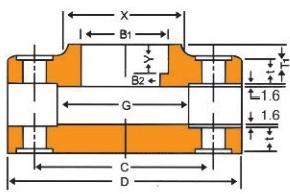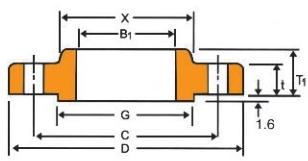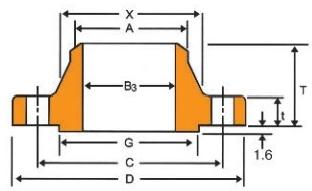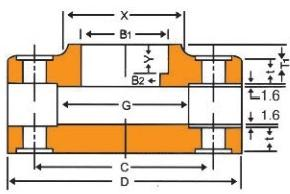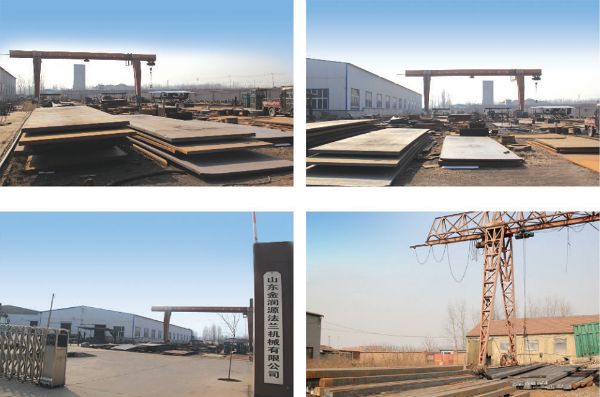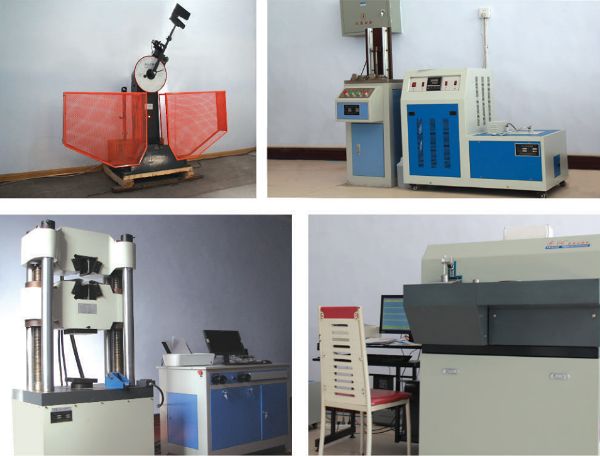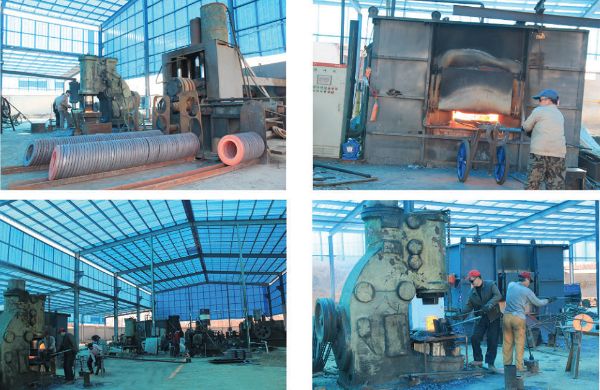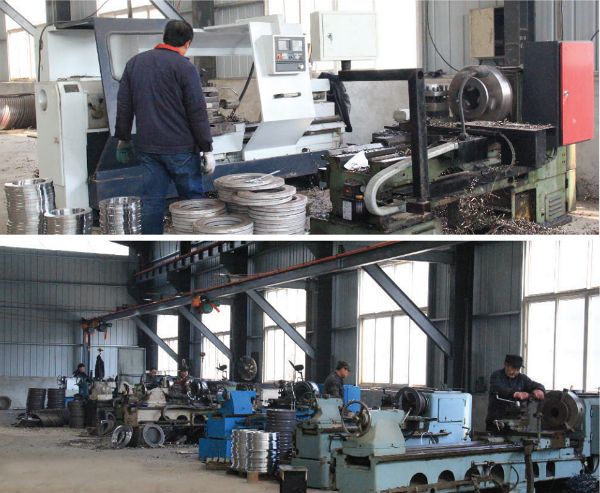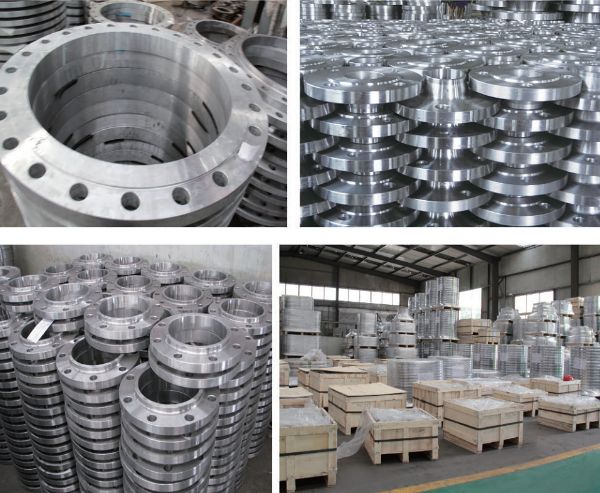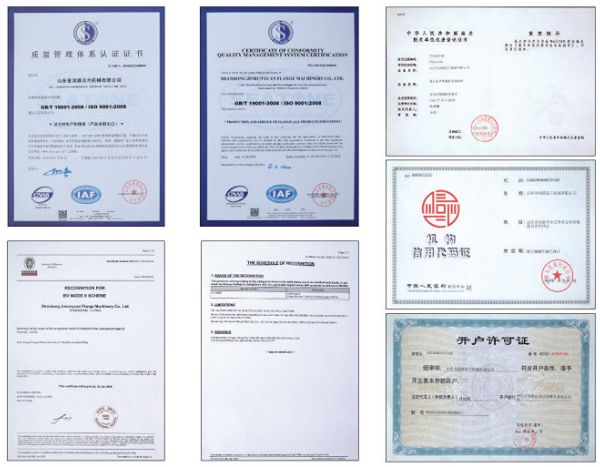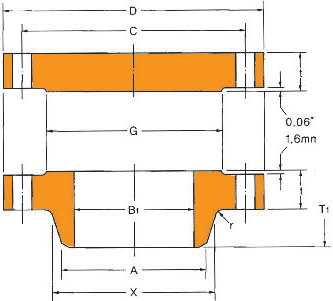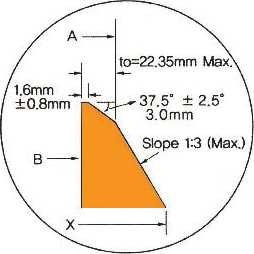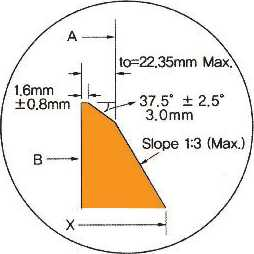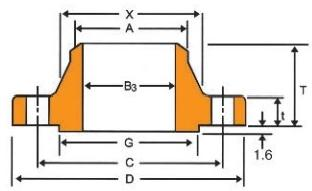JPI7S-15-99 Classe 300 Flanges
Flange é um tipo de peça de conexão que pode conectar tubos, válvulas e equipamentos. As vantagens dos flanges incluem: 1. Boa flexibilidade: a conexão do flange é fácil de desmontar e ajustar, o que é conveniente para a manutenção e substituição do equipamento. 2. Boa vedação: As juntas de flange podem usar diferentes juntas ou juntas para atender a diferentes requisitos de fluido e pressão e ter boa vedação. 3. Forte capacidade de suporte de pressão: As juntas de flange podem suportar grandes pressões internas e externas, tornando-as adequadas para ambientes de trabalho agressivos, como alta temperatura, alta pressão e corrosão. 4. Alta confiabilidade: Uma vez que a conexão do flange é conectada por parafusos e porcas, pode garantir a firmeza da conexão, aumentando assim a estabilidade e confiabilidade dos equipamentos e tubulações. 5. Forte adaptabilidade: As juntas de flange podem ser selecionadas de uma variedade de materiais, tamanhos e especificações de acordo com as necessidades e podem se adaptar a vários ambientes de trabalho e requisitos.
The JPI7S-15-99 Class 300 flanges manufacturing method has countless blessings and characteristics:
High Quality: The manufacturing technique of JPI7S-15-99The manufacturing technique of JPI7S-15-99 Class 300 flanges provides a number of benefits and characteristics:
High-quality materials: The flanges are produced the usage of magnificent materials such as carbon metal or stainless steel, making sure sturdiness and resistance to corrosion.
Accurate dimensions: The manufacturing technique ensures that the flanges are manufactured with particular dimensions, permitting for suitable suit and compatibility with otherThe JPI7S-15-99 Class 300 flanges manufacturing system presents countless blessings and showcases sure characteristics. Here are some of them:
High-quality production: The manufacturing technique ensures that JPI7S-15-99 Class 300 flanges are manufactured with excessive precision and foremost quality. This lets in for dependable overall performance and sturdiness of the flanges.
Compliance with standards: The manufacturing system follows the JPI7S-15-99 fashionable for Class 300 flanges. This ensures that the flanges meet the required specs and can be used in a vast vary of functions besides any compatibility issues.
Thorough checking out and inspection: The manufacturing technique consists of rigorous checking out and inspection processes to make sure that the flanges meet the essential requirements and fantastic requirements. This helps in handing over defect-free merchandise to the customers.
Efficient manufacturing techniques: The manufacturing technique makes use of environment friendly manufacturing techniques, such as superior machining and fabrication methods. This permits for quicker manufacturing and ensures that the flanges are manufactured with utmost accuracy.
Material options: The manufacturing procedure permits for the use of a number materials, such as carbon steel, stainless steel, and alloy steel, based totally on the particular necessities of the customers. This affords flexibility in phrases of fabric selection, enabling the flanges to be appropriate for exclusive working conditions.
Corrosion resistance: The flanges produced thru this technique are designed to be corrosion resistant, making them appropriate for use in environments the place publicity to moisture, chemicals, or different corrosive components is likely.
Wide vary of sizes: The manufacturing manner can accommodate the manufacturing of JPI7S-15-99 Class 300 flanges in a broad range of sizes, from small to giant diameters. This makes the flanges appropriate for numerous industrial applications.
Customization options: The manufacturing technique lets in for customizable elements and specs primarily based on the precise necessities of the customers. This ensures that the flanges can be tailor-made to meet the special desires of one of a kind projects.
Overall, the JPI7S-15-99 Class 300 flanges manufacturing method affords a mixture of quality, precision, and flexibility, making it a dependable desire for a number of industrial applications.
-99 Class 300 flanges manufacturing method has countless blessings and characteristics:
High Quality: The manufacturing technique of JPI7S-15-99The manufacturing technique of JPI7S-15-99 Class 300 flanges provides a number of benefits and characteristics:
High-quality materials: The flanges are produced the usage of magnificent materials such as carbon metal or stainless steel, making sure sturdiness and resistance to corrosion.
Accurate dimensions: The manufacturing technique ensures that the flanges are manufactured with particular dimensions, permitting for suitable suit and compatibility with otherThe JPI7S-15-99 Class 300 flanges manufacturing system presents countless blessings and showcases sure characteristics. Here are some of them:
High-quality production: The manufacturing technique ensures that JPI7S-15-99 Class 300 flanges are manufactured with excessive precision and foremost quality. This lets in for dependable overall performance and sturdiness of the flanges.
Compliance with standards: The manufacturing system follows the JPI7S-15-99 fashionable for Class 300 flanges. This ensures that the flanges meet the required specs and can be used in a vast vary of functions besides any compatibility issues.
Thorough checking out and inspection: The manufacturing technique consists of rigorous checking out and inspection processes to make sure that the flanges meet the essential requirements and fantastic requirements. This helps in handing over defect-free merchandise to the customers.
Efficient manufacturing techniques: The manufacturing technique makes use of environment friendly manufacturing techniques, such as superior machining and fabrication methods. This permits for quicker manufacturing and ensures that the flanges are manufactured with utmost accuracy.
Material options: The manufacturing procedure permits for the use of a number materials, such as carbon steel, stainless steel, and alloy steel, based totally on the particular necessities of the customers. This affords flexibility in phrases of fabric selection, enabling the flanges to be appropriate for exclusive working conditions.
Corrosion resistance: The flanges produced thru this technique are designed to be corrosion resistant, making them appropriate for use in environments the place publicity to moisture, chemicals, or different corrosive components is likely.
Wide vary of sizes: The manufacturing manner can accommodate the manufacturing of JPI7S-15-99 Class 300 flanges in a broad range of sizes, from small to giant diameters. This makes the flanges appropriate for numerous industrial applications.
Customization options: The manufacturing technique lets in for customizable elements and specs primarily based on the precise necessities of the customers. This ensures that the flanges can be tailor-made to meet the special desires of one of a kind projects.
Overall, the JPI7S-15-99 Class 300 flanges manufacturing method affords a mixture of quality, precision, and flexibility, making it a dependable desire for a number of industrial applications.
Nominal Cano Tamanho |
Fora dia.de Flanges |
diâmetro do furo |
Diâmetro do Hub em Bevel A |
Dia.of Hub at Base |
dia.de Criado Face |
Espesso de Flanges |
Raio de Filé |
|||||||||||
Escorregar em Soquete B1 |
Junta sobreposta B2 |
Pescoço de Solda, Soquete B₃ |
||||||||||||||||
JPI |
ANSI |
|||||||||||||||||
A |
B |
D |
JPI |
ANSI |
JPI |
ANSI |
SCH40 |
SCH80 |
SCH160 |
SCH40 |
SCH80 |
SCH160 |
JPI |
ANSI |
x |
G |
t |
R |
15 20 25 |
h % 1 |
95 117 124 |
22.2 27.7 34,5 |
22.4 27.7 34,6 |
23,4 28,9 35,6 |
22,9 28,2 35.1 |
16,1 21,4 27.2 |
14,3 19,4 25,0 |
12,3 16,2 21.2 |
15,8 20,9 26.6 |
13,9 18,8 24.3 |
11,8 15,6 20.7 |
21,7 27,2 34,0 |
21,3 26,7 33,5 |
38,1 47,8 53,8 |
35,1 42,9 50,8 |
14,2 15,7 17.5 |
3 3 3 |
(32) 40 50 |
(14) 1% 2 |
133 155 165 |
43.2 49.1 61.1 |
43.2 49,6 62,0 |
44,3 50,4 62,7 |
43,7 50,0 62,5 |
35,5 41,2 52,7 |
32,9 38,4 49,5 |
29,9 34,4 43.1 |
35,1 40,9 52,5 |
32,5 38,1 49.3 |
29,5 34,0 42,9 |
42,7 48,6 60,5 |
42,2 48,3 60,5 |
63,5 69,9 84.1 |
63,5 73,2 91,9 |
19,1 20,6 22.4 |
5 6 8 |
65 80 (90) |
2% 3 (3%) |
190 210 229 |
77,1 90,0 102.6 |
74,7 90,7 103.4 |
78,7 91,6 104.1 |
75,5 91,4 104.2 |
65,9 78,1 90.2 |
62,3 73,9 85,4 |
57,3 66,9 76.2 |
62,7 77,9 90.1 |
59,0 73,7 85,5 |
54,0 66,7 |
76,3 89,1 101.6 |
73,2 88,9 101.6 |
100,1 117,5 133,4 |
104.6 127.0 139.7 |
25,4 28,4 30.2 |
8 10 10 |
100 (125) 150 |
4 (5) 6 |
254 279 318 |
115,4 141,2 166,6 |
116,1 143,8 170,7 |
116,9 143,0 168,4 |
116,9 144,6 171,5 |
102,3 126,6 151,0 |
97,1 120,8 143.2 |
87,3 108,0 128,8 |
102,3 118,2 154.2 |
97,2 122,3 146,3 |
87,3 109,6 131,8 |
114,3 139,8 165,2 |
114,3 141,2 168,4 |
146,1 177,8 206.2 |
157,2 185,7 215,9 |
31,8 35,1 36,6 |
11 11 13 |
200 250 300 |
8 10 12 |
381 444 521 |
218.0 269.5 321.0 |
221.5 276.4 327.2 |
219.5 271.7 322.8 |
222.3 277.4 328.2 |
199.9 248.8 297.9 |
190.9 237.2 283.7 |
170.3 210.2 251.9 |
202.7 254.5 303.2 |
193.7 242.9 288.9 |
173.1 215.9 257.2 |
216.3 267.4 318.5 |
219.2 273.1 323.9 |
260.4 320.8 374.7 |
269.7 323.9 381.0 |
41.1 47.8 50.8 |
13 13 13 |
350 400 450 |
14 16 18 |
584 648 710 |
358.1 409.0 460.0 |
359.2 410.5 461.8 |
360.2 411.3 462.4 |
333.4 381.0 428.6 |
317.6 363.6 409.6 |
284.2 325.4 366.8 |
333.3 381.0 428.7 |
317.5 363.6 409.6 |
284.2 325.5 366.7 |
355.6 406.4 457.2 |
355.6 406.4 457.2 |
425.5 482.6 533.4 |
412.8 469.9 533.4 |
53.8 57.2 60.5 |
13 13 13 |
|
500 600 |
20 24 |
775 914 |
511.0 613.0 |
513.1 616.9 |
514.4 616.0 |
477.8 574.6 |
455.6 547.8 |
408.0 490.6 |
477.8 574.8 |
455.6 547.7 |
408.0 490.6 |
508.0 609.6 |
508.0 609.6 |
587.2 701.5 |
584.2 692.2 |
63.5 69.9 |
13 13 |
|
Comprimento Thru Hub |
Profundidade de Soquete |
Perfuração |
Dia de Angariado Rosto para Anel Articulação |
Pitch Dia.or Anel & Ranhura |
Anel
De. |
Tipo RTJ |
Aprox. Peso (kg) |
Nominal Cano Tamanho |
||||||||||
Rosca de soquete deslizante |
Volta
Articulação |
Soldadura Pescoço |
Dia de Bolt Circle |
Número de Parafuso |
Dia do furo do parafuso |
Profundidade de Ranhura |
Largura de Ranhura |
Raio de Ranhura |
WN |
S.0 |
SO |
B.L |
||||||
T; |
T2 |
T |
e ainda |
C |
N |
K(min) |
P |
E |
F |
4 |
A |
B |
||||||
22.2 25,4 27,0 |
22,2 25,4 27,0 |
52,4 57,2 61,9 |
9.5 11.1 12.7 |
66.5 82.6 88.9 |
4 4 4 |
16 19 19 |
51,0 63,5 70,0 |
34,14 42,88 50,80 |
R11 R13 R16 |
5,56 6,35 6.35 |
7,14 8,74 8.74 |
0.8 0.8 0.8 |
0,80 1,25 1,58 |
0,65 1,10 1.35 |
0,67 1,12 1.39 |
0.65 1.09 1.38 |
15 20 25 |
C % 1 |
27,0 30.2 33.3 |
27.0 30.2 33.3 |
65,1 68,3 69,8 |
14,3 15,9 17.5 |
98.6 114.3 127.0 |
4 4 8 |
19 vinte e dois 19 |
79,5 90,5 108 |
60,32 68,28 82,55 |
R18 R20 R23 |
6,35 6,35 7,92 |
8,74 8,74 11.91 |
0.8 0.8 0.8 |
2.05 2.93 3.40 |
1,69 2,54 2,92 |
1,74 2,60 3.02 |
1,82 2,70 3.18 |
(32) 40 50 |
(114) (1 para 2 |
38.1 42,9 44,5 |
38,1 43,9 44,5 |
76,2 79,4 81,0 |
19,0 20,6 22.2 |
149,4 168,1 184.2 |
8 8 8 |
vinte e dois vinte e dois vinte e dois |
127 146 159 |
101,60 123,82 131,78 |
R26 R31 R34 |
7,92 7,92 7,92 |
11,91 11,91 11.91 |
0.8 0.8 0.8 |
5.10 7.01 8.71 |
4,24 5,94 7,90 |
4.43 6.21 |
4,86 6,90 8.79 |
65 80 (90) |
2% 3 (3%) |
47,6 50,8 52.4 |
47,6 50,8 52.4 |
85,7 98,4 98,4 |
23,8 23,8 27,0 |
200,2 235,0 269,7 |
8 8 12 |
vinte e dois vinte e dois vinte e dois |
175 210 241 |
149,22 180,98 211.12 |
R37 R41 R45 |
7,92 7,92 7,92 |
11,91 11,91 11.91 |
0.8 0.8 0.8 |
11,3 15,1 19.6 |
9,71 12,4 16.2 |
11,6 15,5 21.2 |
100 (125) 150 |
4 (5) 6 |
|
61,9 66,7 73,0 |
61,9 95,3 101.6 |
111,1 117,5 130.2 |
31,8 33,3 39,7 |
330,2 387,3 450,9 |
12 16 16 |
26 29 32 |
302 356 413 |
269,88 323,85 381,00 |
R49 R53 R57 |
7,92 7,92 7,92 |
11,91 11,91 11.91 |
0.8 0.8 0.8 |
30,3 44,3 64.1 |
24,8 35,9 51 |
34,5 53,9 78,9 |
200 250 300 |
8 10 12 |
|
76.2 82,6 89,9 |
※111,3 ※120,7 ※130,0 |
142,9 146,0 158,8 |
41,3 44,5 49.2 |
514,4 571,5 628,7 |
20 20 vinte e quatro |
32 35 35 |
457 508 575 |
419,10 469,90 533,40 |
R61 R65 R69 |
7,92 7,92 7,92 |
11,91 11,91 11.91 |
0.8 0.8 0.8 |
88,3 113 138 |
70,1 90,4 109 |
106 139 175 |
350 400 450 |
14 16 18 |
|
95,2 106.4 |
※149,7 ※152,4 |
161,9 168,3 |
54,0 63,5 |
685,8 812.8 |
.vinte e quatro vinte e quatro |
35 42 |
635 749 |
584,20 692,15 |
R73 R77 |
9.52 11.13 |
13h49 16.66 |
1,5 1,5 |
169 248 |
136 204 |
222 340 |
500 600 |
20 24 |
|
Nossa fábrica
Blanking de matéria-prima
Exame Laboratorial
Forjamento e forjamento e prensagem
Processamento de máquina
Honra de qualificação empresarial

